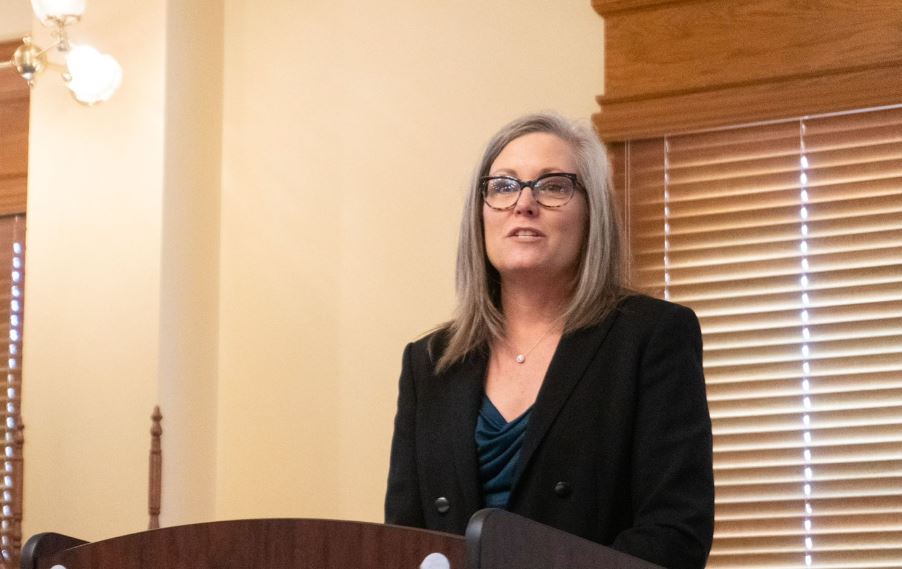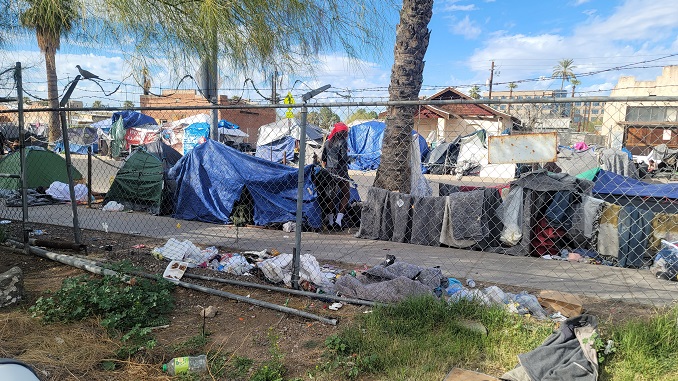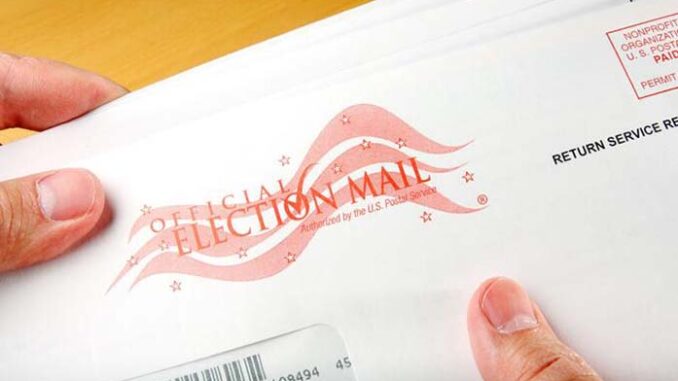
by Corinne Murdock | Mar 29, 2023 | News
By Corinne Murdock |
The Arizona Department of Health Services (ADHS) will give $25 gift cards to attendees of an LGBTQ+ “health equity” event on Tuesday.
Attendance was limited to 30 people, or $750 in gift cards. Attendees were required to be at least 18 years old, living in Pima County, and identifying as an LGBTQ+ community member.
ADHS partnered with the Southern Arizona AIDS Foundation (SAAF) to host the event. SAAF confirmed with AZ Free News that there would be about 12 participants. Also helping facilitate the event was Lenartz Consulting — a company owned by Tracy Lenartz, a health planning consultant for ADHS. Recordings from these in-person listening sessions are anonymized and transferred to ADHS for review before being destroyed.
According to ADHS, referencing the Centers for Disease Control and Prevention (CDC), “health equity” is defined as the fair and just opportunity for all to achieve the highest level of health. Equity is also at the center of the CDC’s 10 Essential Public Health Services framework, unchanged for 25 years until September 2020 — less than four months after the death of George Floyd, which spurred months of Black Lives Matter (BLM) riots and social justice campaigns across state and local governments.
“To achieve equity, the Essential Public Health Services actively promote policies, systems, and overall community conditions that enable optimal health for all and seek to remove systemic and structural barriers that have resulted in health inequities,” stated the CDC. “Such barriers include poverty, racism, gender discrimination, ableism, and other forms of oppression. Everyone should have a fair and just opportunity to achieve optimal health and well-being.”
ADHS adopted an “equity focus” as one of its core values, and added “advancing health equity” to their strategic map issued last year.
The map noted that “equity focused” meant that ADHS valued and respected diverse life differences. In order to understand its equity focus, ADHS suggested resources for the community such as training modules on social determinants of health and how health inequity is rooted in “powerlessness.”
The ADHS definition of social determinants of health suggests that personal behaviors and clinical care are only a minor part of what determines one’s health. The other, greater factors would be social, economic, and environmental conditions: policies, programs, systems, communities such as transportation options, segregation, housing, discrimination, crime, and poor quality of education.
The concept of powerlessness referenced by ADHS comes from institutions like the World Health Organization (WHO), which theorizes that a lack of social and institutional power inequities results in poorer health in the poor, minorities, and women. The WHO suggested that political interventions must be implemented in order to reverse negative health trends: legal reform, or changes in economic or social relationships.
ADHS also participates in an annual Arizona Health Equity Conference which tackles these issues. This year, they will be joined by Arizona State University (ASU) Southwest Interdisciplinary Research Center, Arizona Alliance For Community Health Centers, A.T. Still University, Dignity Health, Esperanca, Equality Health, FSL, Honor Health, Mayo Clinic, Mercy Care, and the University of Arizona (UArizona) Mel & Enid Zuckerman College of Public Health.
Corinne Murdock is a reporter for AZ Free News. Follow her latest on Twitter, or email tips to corinne@azfreenews.com.

by Corinne Murdock | Mar 29, 2023 | News
By Corinne Murdock |
Gov. Katie Hobbs’ spokeswoman issued a general death threat to “transphobes” hours after the school shooting in Nashville. Three children and three faculty were shot and killed at a Christian private school by 28-year-old Audrey Hale, who police announced had likely identified as a transgender male named Aiden.
(Twitter removed the tweet, but it is archived here).
Hobbs’ press secretary, Josselyn Berry, has issued controversial statements before. While communications director for the Arizona State Senate Democratic Caucus in 2020, Berry quote tweeted FBI Most Wanted Terrorist Assata Shakur several days after George Floyd’s death. Shakur escaped prison after having been convicted for murdering a cop and committing armed robbery, among other crimes.
Arizona Senate Democrats also tweeted the quote on their profile, but deleted the offending tweet and issued an apology after backlash.
Berry, a graduate of Arizona State University (ASU) Walter Cronkite School of Journalism and Barrett Honors College, never deleted the tweet. (Her Twitter profile is now private, but this tweet is archived here.)
In addition to controversial public statements, Berry formerly served as a principal actor in Arizona’s leftist dark money network. She served as the program manager for Arizona Wins from 2015 to 2016, and executive director for ProgressNow Arizona (now Progress Arizona) from 2016 to 2019.
Progress Arizona’s sponsor, Way to Win, launched in response to former President Donald Trump’s 2016 victory. It served as a national donor network for the primary purpose of defeating Republicans.
Way to Win spent $110 million in key states, including Arizona, to ensure Democratic victories in 2020. Its major funders include George Soros’ Open Society Foundations and family, Stryker Corporation heiress Patricia Stryker, prominent D.C. consulting firm Arabella Advisors’ Sixteen Thirty (1630) Fund, and the Tides Foundation-backed One Arizona.
Of note, Hobbs’ campaign shared the same mailing address as ProgressNow and Arizona Wins: a UPS store in Phoenix. That address has been shared over the years by several other Democratic political action committees (PACs), activist organizations, and even candidates. These groups also have ties to the political operative behind at least 50 political action committees or candidate campaigns over the last five years.
That operative, Dacey Montoya, had the email for her consulting firm, The Money Wheel, listed as a contact for Hobbs’ secretary of state and gubernatorial campaigns, and received about $188,500 over the past four years. Montoya’s PAC received $37 million from fallen crypto giant FTX leader Sam Bankman-Fried, as well as over $1 million from committees for Sen. Mark Kelly (D-AZ) and Governor Katie Hobbs.
Corinne Murdock is a reporter for AZ Free News. Follow her latest on Twitter, or email tips to corinne@azfreenews.com.

by Daniel Stefanski | Mar 28, 2023 | Economy, News
By Daniel Stefanski |
Arizonans were denied relief at the grocery stores this week as the Democrat governor and Republican-led Legislature remain far apart on how to provide economic assistance to hard-working, middle-class constituents.
On Tuesday, Governor Katie Hobbs vetoed SB 1063, which would have repealed the food municipal tax across the state.
In a statement explaining her veto, Hobbs wrote: “I’ve heard from dozens of local leaders about the impact this legislation would have on municipalities. From potential cuts to service – including public safety – to increased property taxes, it’s clear that this bill doesn’t actually eliminate costs for our residents. It simply moves those costs around. The bill, originally unveiled as a way to mitigate inflation, does not take effect for more than two years. What’s more, it does nothing for the more than 800,000 Arizonans who use SNAP and WIC benefits for their groceries, as these constituents are already exempt from the tax.”
The governor ended her statement with an exhortation for Republican legislative leadership: “Let’s work together to provide real relief for Arizonans struggling with higher costs.”
Republicans immediately expressed their profound disappointment over the veto and the effect that it would have on Arizonans in need of financial relief. Arizona Senate President Warren Petersen responded, “Senate Republicans have been working toward introducing legislation necessary to provide financial relief to all Arizonans, especially low-income families who are feeling the tremendous burden of inflation. It’s very clear the governor has no interest in helping with that financial burden.”
Senate Majority Leader Sonny Borrelli said: “This veto is a disgraceful windfall for cities and an absolute gouge for families. We’re not only paying inflated prices to feed our families, but we’re also paying more in taxes as the cost of food rises. Food is not a luxury; it is a necessity. A tax on our groceries is regressive and hurts everyone. Over the next four fiscal years, cities and towns are estimated to receive an average of $2.3 billion per year in state-shared revenues, which is an increase of $844 million more than the average for the last four fiscal years. And yet the governor vetoed this bill, only padding cities’ bloated budgets instead of leaving more money in the wallets of hardworking taxpayers.”
House Majority Leader Leo Biasiucci tweeted, “During a time of record inflation, families are struggling to put food on the table. Yet, Gov Hobbs vetoes a bill to remove taxes on groceries. Instead, she wants to remove taxes from tampons & diapers.”
Legislative Democrats applauded the governor’s veto. The Arizona House Democrats Caucus wrote, “Soundbite legislation that would handcuff ability of smaller cities and towns to provide public safety, streets, parks, libraries and senior centers. Good veto!”
Governor Hobbs had many other supporters of her veto from around the state. The Arizona League of Cities and Towns, which had opposed the bill as it progressed through the state legislature, tweeted, “Thank you @governorhobbs for vetoing SB1063 and recognizing that the food tax helps fund critical services in many cities and towns and its elimination does not provide targeted relief for those that most need help.”
Goodyear Mayor Joe Pizzillo also championed the governor’s action, stating: “@GovernorHobbs veto of SB1063 protects local decision-making and funding for critical services like public safety, parks & recreation, and infrastructure. #Thankyou”
A divided Arizona government remains more divided as ever as the deadline for the state budget approaches.
Daniel Stefanski is a reporter for AZ Free News. You can send him news tips using this link.

by Daniel Stefanski | Mar 28, 2023 | Education, News
By Daniel Stefanski |
Republicans are leading a historic effort to raise teachers’ salaries, while most Democrats are resisting the current approach in the Arizona State Legislature.
On Monday, the Arizona House moved HB 2800, sponsored by freshman Representative Matt Gress, closer to a final vote in the chamber, amending it in the Committee of the Whole session. This bill “mandates each school district and charter school increase the base salary of all eligible teachers as prescribed.” It also “creates the Pay Teachers First Fund and appropriates a total of $1,100,000,000 in FYs 2024 and 2025 to the Fund for required teacher salary increases.”
According to figures provided by House Republicans, HB 2800 would give Arizona teachers the fourth highest ($50,554) starting salaries in the nation, compared to a current ranking of 27th ($40,554).
Arizona Superintendent of Public Instruction Tom Horne previously announced his strong support of this bill and appeared at a press conference at the state capitol last week with Gress and other lawmakers to tout the legislation’s movement through the House.
When asked by AZ Free News about why he supported HB 2800, Superintendent Horne replied: “I support HB 2800 because no school is better than the quality of the teachers in the classroom. Our surrounding states pay more so we lose good teachers to them, and we can no longer afford to do that.”
Representative Gress thanked Superintendent Horne for his support of the bill, writing, “Thanks @RealTomHorne for your advocacy on #HB2800. Raising teacher pay is key to recruiting and retaining excellent talent. We will not be deterred by the unions who are actively pressuring House Democrats to kill a $10,000 pay raise for teachers.”
Gress submitted a floor amendment to his bill Monday, which passed. The changes, in part, “removes the stipulation that an eligible school may receive the prescribed per teacher base salary increases from the Pay Teachers First Fund only for the lesser of the number of eligible teachers that a) are employed by the school; or b) would be employed by the school if the school had 15 students per eligible teacher.” It also tweaked elements of the proposed school online transparency portal, school districts facilities master plans, and appropriations.
Though both Republicans and Democrats campaign on adequately funding public education in Arizona, Representative Gress’s proposal has met with fierce resistance from many Democrats and school & teacher organizations around the state. Five Democrats voted against the bill in the House Appropriations Committee, and representatives from the AZ School Administrators Association, AZ Education Association, Save Our Schools Arizona, and AZ School Boards Association have registered their opposition.
In the lead-up to Monday’s deliberations, the House Democrat Caucus ardently campaigned against HB 2800, calling it a “wolf in sheep’s clothing” and “deeply flawed.”
Should the bill pass the House, it will soon head to the Arizona Senate for consideration and a potential vote in that chamber in the near future. If it clears the Senate, Democrat Governor Katie Hobbs will be forced to decide between giving teachers a $10,000 raise or denying them this much-needed increase.
Daniel Stefanski is a reporter for AZ Free News. You can send him news tips using this link.

by Corinne Murdock | Mar 28, 2023 | News
By Corinne Murdock |
On Monday, the Maricopa County Superior Court ruled that the city of Phoenix is at fault for the homeless crisis, most evident in the massive encampment downtown known as “The Zone.”
Judge Scott Blaney ruled that city officials had done nothing to improve The Zone, declaring it a public nuisance. Rather, Blaney declared that the city had created and maintained The Zone. Blaney added that the actions undertaken by the city, allegedly to address the homeless crisis, had served only to grow its bureaucracy and throw money into government and nonprofit programs that haven’t yielded any discernible results.
“With few exceptions, the action items about which city representatives testified centered around the creation of more bureaucracy, additional staff positions, and obtaining additional funding for programs to vaguely address homelessness in general,” stated Blaney. “The Court received very little evidence — if any — that the City intends to take immediate, meaningful action to protect its constituent business owners, their employees, and residents from the lawlessness and chaos in the Zone.”
Blaney ordered the city to abate The Zone by permanently removing the encampments in public rights of way; cleaning up the biohazardous materials including human feces and urine, drug paraphernalia, and other trash; and removing individuals committing offenses against the public order. Effectively, the judge ordered the city to enforce existing laws.
The city has until July 10 to achieve material results toward compliance with the court’s ruling.
In the 23-page ruling, Blaney agreed with arguments posed by the plaintiffs, made up of residents and business owners in The Zone: that the city stopped enforcing laws within The Zone, resulting in increased violent crime, property crime, prostitution, public indecency, public drug use, a blocks-long biohazard, fire hazards, and environmental destruction.
READ OUR INVESTIGATIVE REPORT ON THE ZONE
Notably, Blaney agreed that the owners of Maker Kitchens had the right to install the dinosaur statues on the right of way adjacent to its building to discourage the homeless from re-establishing their encampments after the city did a cleanup to do gas line work. Blaney ruled that the city had arbitrarily enforced its laws so as to ignore violations by the homeless on that land and yet demand removal of the statues.
Blaney ruled that the city couldn’t force the restaurant to remove the dinosaur statues until it cleaned up The Zone or the court issued a further order.
Blaney ruled that the city had “abused its discretion through the arbitrary application of the law and provision of taxpayer funded security in The Zone.” He also ruled that the residents and business owners who filed the lawsuit had a strong possibility of receiving damages on the basis of irreparable injury, should the city not provide relief by mitigating The Zone.
Blaney agreed that city leaders erroneously applied the Ninth Circuit Court of Appeals’ ruling in Martin v. City of Boise, which determined that municipalities couldn’t enforce public camping laws against the homeless when no adequate temporary shelter options existed.
The judge further noted that the city had wholly ignored the residents’ and business owners’ proposals to resolve the homeless crisis, an outdoor shelter space, presented in January 2020 — just before the crisis “really got out of hand.” However, the city ignored all proposed plans to mitigate the crisis until one month before the plaintiffs filed their lawsuit, last October. That’s when the city approved the construction of a “sprung structure” containing 200 additional shelter beds.
Yet, Blaney stated that the city’s proposed shelter options were either designed as temporary, being seasonal, or as speciality situations, being intended for domestic violence survivors or COVID-19 response.
At one point in his ruling, Blaney surmised that violent, organized crime had taken root in The Zone. AZ Free News reported that gangs run The Zone, assaulting and charging encampment space rent to the homeless.
“The evidence also strongly suggests that the City created and maintained the dire situation that currently exists in The Zone through its failure, and in some cases refusal, to enforce criminal and quality of life laws in The Zone,” said Blaney. “The City’s refusal to meaningfully enforce statutes and ordinances in The Zone has created a classic ‘siren song’ to certain individuals that are enticed at their peril by The Zone’s drugs, sex, and lack of societal rules.”
The court’s ruling comes days after the city promised it would arrange some kind of meeting on the issue at some point following back-to-back murders in The Zone.
Corinne Murdock is a reporter for AZ Free News. Follow her latest on Twitter, or email tips to corinne@azfreenews.com.

by Daniel Stefanski | Mar 28, 2023 | News
By Daniel Stefanski |
An Arizona legislative proposal to increase transparency into state elections is slowly making progress through the Senate, and it appears to have some bipartisan support.
SB 1324, sponsored by Senator Ken Bennett, “requires a county recorder to publish a list of eligible voters, with outlined information, on the county recorder’s website 10 days before a primary and general election,” and it “requires the Secretary of State to digitally publish a list of all persons who voted in an election, all ballot images and a sortable cast vote record” – according to the purpose provided by the Arizona Senate.
In defense of his bill after shepherding it through the Committee of the Whole session, Senator Bennett said, “The answer to confidence in our elections is transparency. As leaders of this state, we should not fear transparency. Candidates, whether they’re winners or losers, should not fear transparency. County and state election officials should not fear transparency. If things were done right in the election, there’s no need to fear that detailed information being released so people can verify.”
During the Committee of the Whole session, three amendments were added to the bill – two from the bill sponsor and one from Democrat Senator Christine Marsh. Bennett alluded to Democrat Secretary of State (SOS) Adrian Fontes supporting his second amendment, which would prohibit “the SOS, county recorder and other county officer in charge of elections from altering or adding any voter data as part of any security measure in implementing the requirements relating to voter lists and ballot images.”
The multifaceted Marsh amendment “requires the SOS to establish and administer an electronic portal to receive requests for access to the ballot image materials”; “requires, for a person requesting access to the materials, the SOS to require the person’s contact information and a declaration signed by the person stating that the person will not use the material for a commercial purpose as prescribed by statute, alter the images or information, or use the information or images for voter intimidation”; and “classifies, as a class 5 felony, the act of using any portion of a voter list or ballot image for a commercial purpose or intentionally altering any information of images of the voter lists, ballot images or cast vote record.”
Marsh was asked if she would support SB 1324 after her amendment was adopted and told her Republican colleagues that she was still a no on the bill.
Bennett explained that his bill is about “four pieces of data: before the election, release the list of people eligible to vote in the election; after the election and canvass, release the list of who voted in the election; the ballot images – there should be one ballot image for everyone on the who-voted-list; the cast-vote record, which is a spreadsheet with the votes of individual anonymous ballots.” He engaged several questions and answers from his Democrat colleagues during the Committee of the Whole session.
In February, the Senate Elections Committee, chaired by Senator Wendy Rogers, approved the legislation with a party-line 5-3 vote.
Maricopa County Recorder Stephen Richer, a Republican, announced his support for SB 1324 back in February after it passed through the Senate Elections Committee. Richer stated, “Elections work when there is openness and transparency. SB 1324 does that by creating a system where each county recorder can inform voters before and after every election about who is eligible to vote while protecting voter confidentiality. All three – the list of eligible voters, the list of who voted, and the cast vote record – will be available to anyone who wants them. SB 1324 and Speaker Ben Toma’s legislation, HB 2560, contain similar language and will further strengthen our elections by enshrining the kind of transparency that can build public trust in our elections.”
Daniel Stefanski is a reporter for AZ Free News. You can send him news tips using this link.






